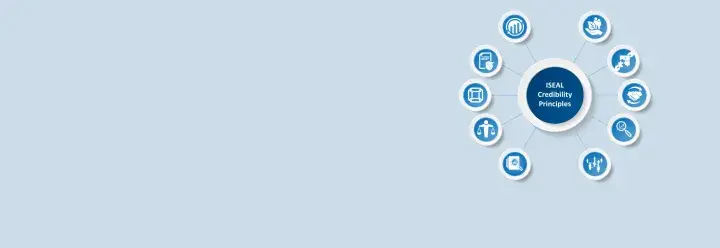Credibility Principles help businesses identify reliable partners to meet sustainability demands
As the world’s sustainability challenges intensify, the demands placed on business have never been greater – from developing science-based net-zero strategies, to aligning with the UN Sustainable Development Goals, to disclosing their risks, impacts and dependencies on nature as required under the new Global Biodiversity Framework.
Whether it’s to comply with new regulatory requirements, protect their public reputation or guard against supply risks, keeping on top of social and environmental issues is increasingly central to business success.
Voluntary sustainability standards and similar systems can help businesses to navigate this challenging terrain. But there’s a sometimes bewildering range of labels, standards and accreditations out there, with more than 200 ecolabels in use in the EU alone. So how are businesses supposed to identify which sustainability systems will make reliable, trustworthy and effective partners?
The answer is to look for systems that follow the ISEAL Credibility Principles. Developed through global consultation with a wide range of stakeholders, the 10 principles define the core values and key attributes of credible and effective sustainability systems, and outline why these matter for improving sustainability performance and delivering impacts. They cover areas such as multi-stakeholder engagement, impartiality and transparency, along with demonstrating measurable progress, ensuring continual improvement and adding value.
Businesses can use the Credibility Principles to benchmark different systems and tools, and select those that will help them deliver against their sustainability objectives and drive real impact and value. Research has shown that, as well as contributing to positive environmental and social impacts, credible sustainability systems provide multiple business benefits – from risk management and monitoring, to market access, to increased revenue and reputational benefits.
To help put these principles into practice, ISEAL will soon be releasing its newly updated Code of Good Practice. Developed through extensive stakeholder consultation, the Code outlines how sustainability systems should apply the Credibility Principles in key areas such as assurance, impacts measurement and standard-setting. It also covers emerging areas of good practice that are particularly relevant for businesses.
One of these is due diligence – an increasingly important concern in the light of new legislation in the EU and elsewhere. While they are not a substitute for corporate due diligence, credible sustainability systems can provide many of the building blocks – such as providing information to help analysis of human rights and environmental risks in supply chains, and a means to engage suppliers and support smallholder producers.
Claims management is another important area, as sustainability claims come under increased scrutiny from regulators and the public. Systems that follow the ISEAL Credibility Principles and Code of Good Practice enable businesses to communicate about their sustainability initiatives and impacts in a transparent, trustworthy way, while avoiding greenwash and misleading claims.
ISEAL’s Executive Director, Karin Kreider, said: “For businesses that are serious about sustainability, credibility matters. We’ve worked with multiple stakeholders from all over the world to define the principles behind credible sustainability systems, and demonstrate how the principles can be applied in practice. We believe our Credibility Principles can help businesses meet the many demands they face while playing their part in tackling the biggest social and environmental issues of our time.”


